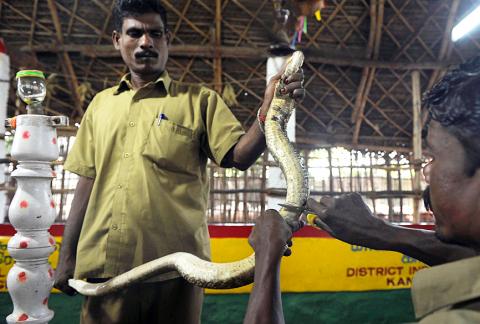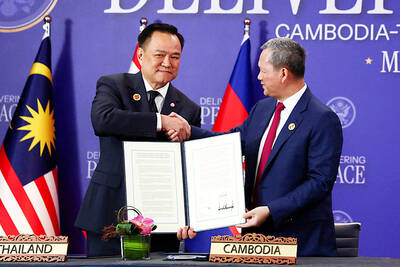A small scythe, a crowbar and a bundle of canvas bags are all that Kali and Vedan carry when they venture into the fields of southern India to catch some of the world’s deadliest snakes.
Their skills, passed from generation to generation of the Irula tribe they belong to, are crucial for the production of antivenom in a country with the world’s highest number of deaths from snake bites.
Since it began in the 1970s, the Irula snake catchers’ cooperative on the outskirts of the southern city of Chennai has revolutionized the treatment of snake bites in India, enabling it to produce enough antivenom to supply hospitals across the country.

Photo: AFP
It also provides much-needed income for the Irula, one of the region’s most deprived groups, who used to hunt snakes and sell the skins, but lost their livelihood overnight when India banned the practice in 1972.
Kali learned the intricate skill of tracking and then catching snakes from his father, whose abilities were renowned in the small community.
Now the 36-year-old uses those same skills to catch snakes for the cooperative, which keeps them for a month under license from the government and harvests their venom before returning them to nature.
This month he is tasked with catching the saw-scaled and Russell’s vipers — two of India’s four deadliest snake varieties — under the quota system the cooperative uses to ensure it harvests the right quantity of venom.
Within 20 minutes of starting the search in rice fields less than a kilometer from a busy highway, he has spotted a tiny snake concealed under the bark of a fence post, its brown markings barely visible against the wood.
Minutes later his partner Vedan has expertly maneuvered the slithering creature with his bare hands into a canvas bag, which he secures with a tight knot and slings into a plastic shopping basket.
“It’s an adult female saw-scaled viper, one of the most venomous snakes,” said Kali, who like many Indians goes by only one name. “In winter they like to hide in tree bark, that’s how we found it.”
Kali is to be paid 300 rupees (US$4.41) for the viper under a tariff system that rises to 2,500 rupees for a cobra.
Sometimes he gets lucky and finds a snake quickly; other times he will go for days without a catch, but the money is good, and unlike him, Kali’s children are able to attend school regularly.
The cooperative, which was established by the American conservationist Rom Whitaker and is now controlled by state authorities, will keep the snake for a month and harvest its venom four times.
Nonlethal amounts of venom from four snake species are injected into horses, which then produce antigens that are used to make antivenom for all bites.
That is the only reliable treatment for a human bitten by a venomous snake, although the Irula also use herbal treatments that they say give them more time to reach a hospital.
India has 244 snake species and the four most venomous — the cobra, krait, Russell’s viper and saw-scaled viper — are found throughout the country.
Experts said thousands of people die every year from snakebites in India, still a predominately rural economy where farmers run the risk of being bitten every time they go into their fields.
Government figures showed just a few recorded cases every year, but most go unreported because victims never reach hospitals and a 2011 study put the number of annual deaths at about 46,000.
Villagers living near the cooperative said snakes frequently entered their homes, putting them at risk of being bitten in their sleep — but were pretty nonchalant about the threat.
“In our village, one person was bitten by a snake. He was taken to hospital and he recovered,” said Maragadham, a 36-year-old child minder. “Snakes are found in most homes, but they are not a threat to us.”
That is because most health facilities in India now have sufficient supplies of antivenom.
Back at the cooperative, Kali and Vedan have placed their catch in a clay pot in preparation for the extraction process.
The extractor takes out the snake, gripping it below the head, which he places in front of a thin piece of leather that has been stretched over the top of a small glass jar to imitate skin.
As the snake opens its jaw and sinks its fangs into the leather covering, the deadly liquid drips into the jar.
“The snake has to bite, only then will it inject the venom,” explains R. Kumar after snipping a few scales from the snake’s skin to indicate that extraction has taken place. “We don’t have much education. We’re not interested in any other work, but this work is important, it is sacred to us.”

Shamans in Peru on Monday gathered for an annual New Year’s ritual where they made predictions for the year to come, including illness for US President Donald Trump and the downfall of Venezuelan President Nicolas Maduro. “The United States should prepare itself because Donald Trump will fall seriously ill,” Juan de Dios Garcia proclaimed as he gathered with other shamans on a beach in southern Lima, dressed in traditional Andean ponchos and headdresses, and sprinkling flowers on the sand. The shamans carried large posters of world leaders, over which they crossed swords and burned incense, some of which they stomped on. In this

‘NO COUNTRY BUMPKIN’: The judge rejected arguments that former prime minister Najib Razak was an unwitting victim, saying Najib took steps to protect his position Imprisoned former Malaysian prime minister Najib Razak was yesterday convicted, following a corruption trial tied to multibillion-dollar looting of the 1Malaysia Development Berhad (1MDB) state investment fund. The nation’s high court found Najib, 72, guilty on four counts of abuse of power and 21 charges of money laundering related to more than US$700 million channeled into his personal bank accounts from the 1MDB fund. Najib denied any wrongdoing, and maintained the funds were a political donation from Saudi Arabia and that he had been misled by rogue financiers led by businessman Low Taek Jho. Low, thought to be the scandal’s mastermind, remains

Near the entrance to the Panama Canal, a monument to China’s contributions to the interoceanic waterway was torn down on Saturday night by order of local authorities. The move comes as US President Donald Trump has made threats in the past few months to retake control of the canal, claiming Beijing has too much influence in its operations. In a surprising move that has been criticized by leaders in Panama and China, the mayor’s office of the locality of Arraijan ordered the demolition of the monument built in 2004 to symbolize friendship between the countries. The mayor’s office said in

FIGHTING CONTINUES: Thai military dropped 40 bombs on border areas, Cambodia said, while Bangkok said Phnom Penh launched heavy attacks and damaged homes Cambodia yesterday accused Thailand of intensifying its bombardment of disputed border areas, even as officials from the two countries attend a multi-day meeting aimed at negotiating an end to deadly clashes. The neighbors’ long-standing border conflict reignited this month, shattering an earlier truce and killing more than 40 people, according to official counts. About 1 million people have also been displaced. Cambodian and Thai officials were in their third day of talks at a border checkpoint, with ministers of defense from the two countries scheduled to meet today. However, the Cambodian Ministry of National Defense said Thailand’s military carried out a heavy